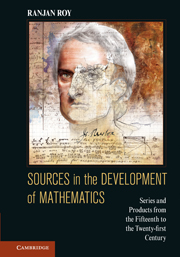 Sources in the Development of Mathematics
Sources in the Development of Mathematics Book contents
- Frontmatter
- Contents
- Preface
- 1 Power Series in Fifteenth-Century Kerala
- 2 Sums of Powers of Integers
- 3 Infinite Product of Wallis
- 4 The Binomial Theorem
- 5 The Rectification of Curves
- 6 Inequalities
- 7 Geometric Calculus
- 8 The Calculus of Newton and Leibniz
- 9 De Analysi per Aequationes Infinitas
- 10 Finite Differences: Interpolation and Quadrature
- 11 Series Transformation by Finite Differences
- 12 The Taylor Series
- 13 Integration of Rational Functions
- 14 Difference Equations
- 15 Differential Equations
- 16 Series and Products for Elementary Functions
- 17 Solution of Equations by Radicals
- 18 Symmetric Functions
- 19 Calculus of Several Variables
- 20 Algebraic Analysis: The Calculus of Operations
- 21 Fourier Series
- 22 Trigonometric Series after 1830
- 23 The Gamma Function
- 24 The Asymptotic Series for ln Γ(x)
- 25 The Euler–Maclaurin Summation Formula
- 26 L-Series
- 27 The Hypergeometric Series
- 28 Orthogonal Polynomials
- 29 q-Series
- 30 Partitions
- 31 q-Series and q-Orthogonal Polynomials
- 32 Primes in Arithmetic Progressions
- 33 Distribution of Primes: Early Results
- 34 Invariant Theory: Cayley and Sylvester
- 35 Summability
- 36 Elliptic Functions: Eighteenth Century
- 37 Elliptic Functions: Nineteenth Century
- 38 Irrational and Transcendental Numbers
- 39 Value Distribution Theory
- 40 Univalent Functions
- 41 Finite Fields
- References
- Index
8 - The Calculus of Newton and Leibniz
Published online by Cambridge University Press: 05 June 2012
- Frontmatter
- Contents
- Preface
- 1 Power Series in Fifteenth-Century Kerala
- 2 Sums of Powers of Integers
- 3 Infinite Product of Wallis
- 4 The Binomial Theorem
- 5 The Rectification of Curves
- 6 Inequalities
- 7 Geometric Calculus
- 8 The Calculus of Newton and Leibniz
- 9 De Analysi per Aequationes Infinitas
- 10 Finite Differences: Interpolation and Quadrature
- 11 Series Transformation by Finite Differences
- 12 The Taylor Series
- 13 Integration of Rational Functions
- 14 Difference Equations
- 15 Differential Equations
- 16 Series and Products for Elementary Functions
- 17 Solution of Equations by Radicals
- 18 Symmetric Functions
- 19 Calculus of Several Variables
- 20 Algebraic Analysis: The Calculus of Operations
- 21 Fourier Series
- 22 Trigonometric Series after 1830
- 23 The Gamma Function
- 24 The Asymptotic Series for ln Γ(x)
- 25 The Euler–Maclaurin Summation Formula
- 26 L-Series
- 27 The Hypergeometric Series
- 28 Orthogonal Polynomials
- 29 q-Series
- 30 Partitions
- 31 q-Series and q-Orthogonal Polynomials
- 32 Primes in Arithmetic Progressions
- 33 Distribution of Primes: Early Results
- 34 Invariant Theory: Cayley and Sylvester
- 35 Summability
- 36 Elliptic Functions: Eighteenth Century
- 37 Elliptic Functions: Nineteenth Century
- 38 Irrational and Transcendental Numbers
- 39 Value Distribution Theory
- 40 Univalent Functions
- 41 Finite Fields
- References
- Index
Summary
Preliminary Remarks
Newton was a student at Cambridge University from 1661 to 1665, but he does not appear to have undertaken a study of mathematics until 1663. According to de Moivre, Newton purchased an astrology book in the summer of 1663; in order to understand the trigonometry and diagrams in the book, he took up a study of Euclid. Soon after that, he read Oughtred's Clavis and then Descartes's Géométrie in van Schooten's Latin translation. By the middle of 1664, Newton became interested in astronomy; he studied the work of Galileo and made notes and observations on planetary positions. This in turn required a deeper study of mathematics and Newton's earliest mathematical notes date from the summer of 1664. On July 4, 1699, Newton wrote in his 1664–65 annotations on Wallis's work that a little before Christmas 1664 he bought van Schooten's commentaries and a Latin translation of Descartes and borrowed Wallis's Arithmetica Infinitorum and other works. In fact, his meditations on van Schooten and Wallis during the winter of 1664–65 resulted in his discovery of his method of infinite series and of the calculus.
Following the methods of van Schooten's commentaries, Newton devoted intense study to problems related to the construction of the subnormal, subtangent, and the radius of curvature at a point on a given curve. Newton's analyses of these problems gradually led him to discover a general differentiation procedure based on the concept of a small quantity, denoted by o, that ultimately vanished.
Information
- Type
- Chapter
- Information
- Sources in the Development of MathematicsSeries and Products from the Fifteenth to the Twenty-first Century, pp. 120 - 139Publisher: Cambridge University PressPrint publication year: 2011